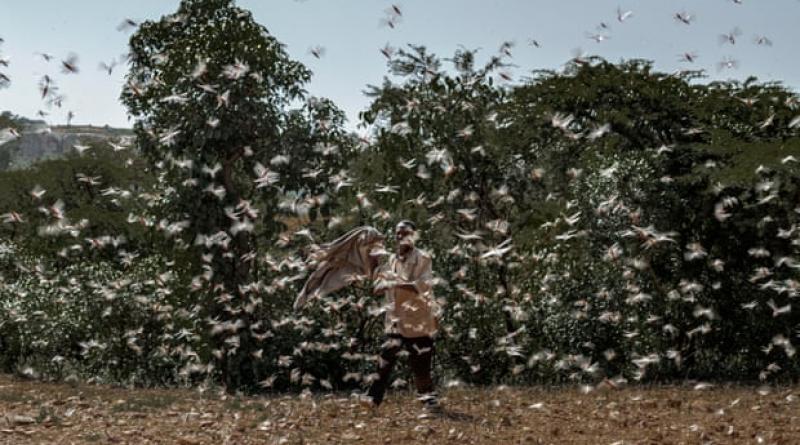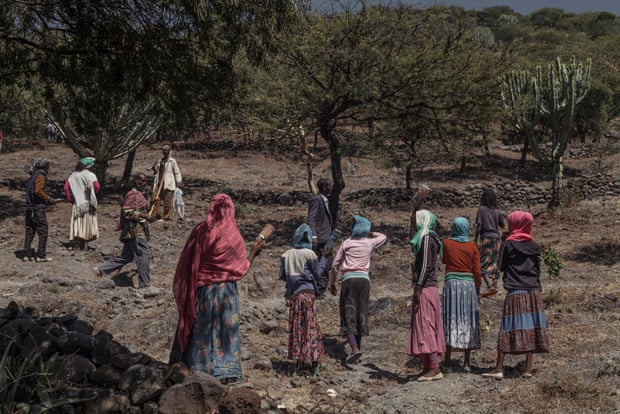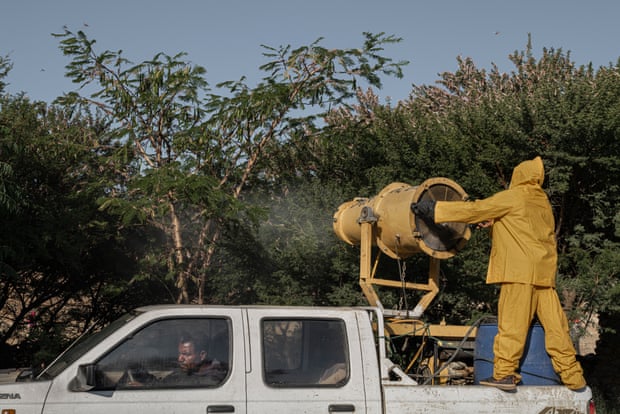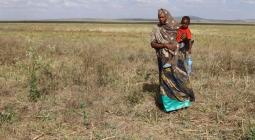How war threatens Ethiopia's struggle against worst locust swarm in 25 years.

As surveillance and spraying operations cease due to conflict, there are fears the existing food crisis could worsen.
They marched over grassy plateaux and down craggy hillsides, beating the earth with sticks and blasting gunshots into the darkening skies.
“Never before have we seen something like this,” says Mulualem Berhe, a 54 year-old farmer shaking a plastic bottle filled with pebbles, thick plumes of smoke enveloping the trees behind him. A few feet away a pickup truck rolls into view, teenagers crowded into the back, blowing whistles and yelling – eyes fixed on the horizon.
Almost every inhabitant of Debrekal, a district of scattered homesteads near the northern Ethiopian town of Adwa, is enlisted in the battle against billions of desert locusts that descended in October and have ravaged countless fields. The villagers’ methods are simple and time-honoured: smoke, guns, and noise.
After an unusually long and wet rainy reason, which made perfect breeding conditions, what the UN called the “worst locust swarm in 25 years” has returned with a vengeance to the Horn of Africa.
Mulualem, who has a small field of teff and two oxen to till it, is one of the unlucky ones: his entire harvest was ruined. “As our grandfathers told us: if you make sound the locusts will leave,” he says. “But now there are so many, nothing gets rid of them.”
Last year, the plague destroyed 350,000 tonnes of cereals and more than 1.2m hectares (3m acres) of pasture in Ethiopia. This year is expected to be even worse. Since January locusts have laid waste to more than 200,000 hectares (almost half a million acres) of farmland. Boosted by the rains, the locusts’ numbers multiplied 8,000-fold, according to the UN’s Food and Agriculture Organization (FAO).
Now the fight to control them has been dealt another blow: the outbreak of war in northern Ethiopia between the regional government of Tigray, where Awda is situated, and the federal government of Ethiopia’s prime minister, Abiy Ahmed.

A security crisis as the locust invasion takes place puts the wider region at risk. Swarms have been reported in Kenya, as well as smaller ones in Djibouti, Eritrea, Sudan and Somalia. But with its great expanses of fertile cropland, no country has been so afflicted – and none is more crucial to regional efforts to control the insects – than Ethiopia.
“Ethiopia is the worst affected – it’s the frontline,” said Fatouma Seid of FAO before the war erupted.
Nearby Yemen – ground zero for the Horn of Africa’s locust plague, with the insects typically present throughout the year – is racked by civil conflict and has been unable to get breeding under control for many years. Somalia, which is also highly precarious, poses similar challenges for containment operations.
Now there are fears Ethiopia might also lose its grip. A UN internal document seen by Reuters last week said efforts to combat the locust swarms were believed to have stopped in Tigray because of the conflict. Aerial operations – involving planes and helicopters for both surveillance and spraying pesticide – have ceased. Young men and some women, who stepped up to confront the locusts last month, are now being mobilised for war.
That war may worsen an already fragile humanitarian situation. According to the FAO, recurring swarms had left a million people across Ethiopia in need of emergency food assistance by early April. Now, in Tigray, banks have been closed and supply routes blocked. About 600,000 people in the region depend on food assistance, while another million people receive other forms of support, all of which are now disrupted, the UN’s Office for the Coordination of Humanitarian Affairs (OCHA) said in a report released on 7 November.

Not all is lost. Ethiopia’s campaign against the locusts is low-tech but labour intensive and, in Tigray especially, fairly well organised.
At the height of the campaign in the region last month, local experts moved from village to village, rallying young people and relaying messages by phone to regional officials who tracked the locusts’ movements and identified areas for chemical spraying at night. In Mekelle, Tigray’s regional capital, computer scientists collated the information to generate daily insect maps. Each night at 7pm, Atinkut Mezgebu Wubneh, the regional agriculture chief, appeared on state television to update the public on the locusts’ movements.
These methods are practised throughout Ethiopia, with varying degrees of success.
“Ethiopia has done a great job in terms of quantity,” a FAO official says. “In terms of areas where there are control operations, 60% to 70% of the entire region – including the Gulf countries – is in Ethiopia alone. And we’re talking about a vast country with very little capacity and where remote targets can be very difficult to reach.”

Swarms of locusts are seen over agricultural fields in Debrekal, Ethiopia. Photograph: Yonas Tadesse
Since the start of this month Tigray and the rest of Ethiopia’s northern highlands have received respite, as the swarms have swung south and eastwards towards Somalia and Kenya. This gives the government time to reset before the expected resurgence early next year. On 10 November a team of specialist locust fighters from Israel arrived to boost operations with the use of new technologies including surveillance drones.
But significant challenges await. When the Guardian visited Adwa in late October local farmers were gloomy about the brewing confrontation between their leaders and Abiy’s government in the capital, Addis Ababa, and complained that it was hampering efforts to defeat the locusts.
“The federal government is not supporting us,” says Mulualem. “It is trying to kill us.”
“We get no support at all,” says Haregot Gebremedhin, a 72 year-old farmer and priest, who was frantically harvesting his teff crop as an immense swarm of locusts gathered overhead. He and his wife echoed others in the area when they recalled the last great locust invasion in living memory: the plague of 1958-59, during the reign of Emperor Haile Selassie. Several thousand tonnes of cereals were destroyed and there were severe food shortages – and famine – in the following years.
“We haven’t seen anything like this in our lifetime,” says his wife, Belaynesh Woldemikael, hitting a scrap of corrugated metal with a stick as her daughter prepares a fire to ward away the locusts. “Is this payment for our sins?”
16 November 2020
The Guardian




